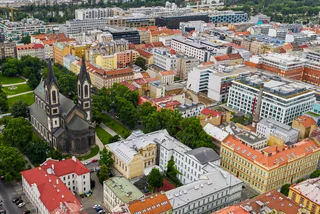The middle class is experiencing a gradual decline in the Czech Republic, with more people relying on state benefits, despite a historically low unemployment rate and moderate wage growth. The trend points to a weakening social protection system, particularly for those at the bottom of the income ladder.
According to experts, these changes are being driven by a combination of high inflation, rising energy costs, and falling real wages.
Recent analysis from the Agency for Social Inclusion paints a concerning picture of a widening gap between the working middle class and the most vulnerable populations, highlighting a growing reliance on social benefits. This trend is creating new challenges for local authorities and social services.
Middle class struggles as benefits rise
"In Czechia, the working middle class is experiencing a decline. We typically associate this with rising unemployment, but that’s not happening here," Lucie Trlifajová, an expert at the Agency for Social Inclusion, tells Czech News Agency, adding that while unemployment rates are low, the Czech middle class is increasingly falling into poverty.
"For a long time, the Czech Republic has had the lowest unemployment in the EU. But it has also experienced the biggest decline in real wages."
The Czech working class has seen an unexpected rise in claims for housing benefits and child allowances in recent years. This increase in demand is particularly noticeable in the suburbs surrounding Prague and other large cities. More people, including university-educated individuals, are seeking financial help from the state.
"We’ve seen a growing number of people from the lower middle class coming to our counseling centers for support. This is something we didn’t expect," adds Barbora Halířová, an expert on debt issues at the Agency for Social Inclusion.
Growing reliance on state support
The increased need for state benefits comes against a backdrop of high inflation, rising energy prices, and falling real wages. Changes to the system of housing allowances and child benefits have also contributed to the rise in beneficiaries. Families earning up to 3.4 times the subsistence minimum are now eligible for child allowances, up from 2.7 times the minimum in previous years.
Key to the distribution of benefits is the subsistence minimum, which currently stands at CZK 4,860 for individuals. While this figure was slightly raised in January 2023, Trlifajová pointed out that the increase was not nearly enough to keep up with inflation.
"The protective function of the subsistence minimum is diminishing. If we account for inflation, the amount should have been much higher, around CZK 7,082," she explains.
Despite the rise in social benefits for households, the number of individuals receiving social welfare has remained stagnant. Trlifajová argues that this indicates a failure of the systems meant to protect the most vulnerable.
"When the middle class begins to sink, it’s inevitable that the poorest will suffer even more," she says.
The Agency's Social Exclusion Index reveals that municipalities with the highest levels of exclusion increased by 50, while those with minimal exclusion dropped by 212. This further illustrates the growing challenges faced by both the middle class and the most marginalized groups.












 Reading time: 2 minutes
Reading time: 2 minutes 



































